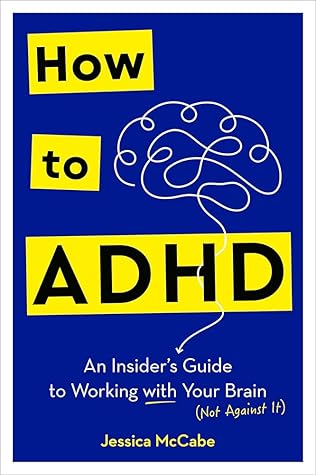More on this book
Community
Kindle Notes & Highlights
Read between
September 19 - October 5, 2025
The fact that I could sometimes exceed expectations made it even more frustrating for me—and everyone around me—when I failed to meet the basic ones.
So we learn to mask our ADHD behaviors and do what’s expected of us—be quiet, sit still, pay attention—when we’re in public. We pay the price later—melt down, feel exhausted, stare blankly at a wall, or scroll through social media for hours just trying to recharge.
Be a bumblebee. Carry what you learned from one experience and use it to “pollinate” your next venture. Those with ADHD are often referred to as a “jack of all trades, master of none,” but have you heard the expanded version of that quote? It says, “A jack of all trades is a master of none, but oftentimes better than master of one.” There’s value in building a diverse skill set.
“Sometimes I just don’t get motivated, and that can be okay. It’s important for us not to always have to be motivated. Sometimes we can exist and enjoy the world without getting stuff done.”
I can’t keep track of how I’m being treated. Is this friend saying something unkind for the first time or the fiftieth? What was that last fight about, anyway? Forgetful people—particularly those of us with low self-esteem (see above)—can be easy to manipulate.
It can be helpful to dump out everything we want to do, and then narrow that down to what we’re actually able to do.[*1] Dr. LaCount recommends choosing no more than three to five to-dos per day. Because prioritizing can be a challenge for us, he suggests choosing ones that, if you do them, will make you feel like today was a success.
Humans are social creatures, even those of us who have trouble socializing.
There’s a reason we return home from a social event and mentally review everything we could have possibly done wrong. From past experience, we know that there are things we may have done “wrong” socially that we missed. And because we also “base our interpretations on the most recently supplied social information”—if the current message we’re getting is negative (like, they haven’t responded to our text messages saying we had a good time) we assume the status of the relationship is negative.
Rejection sensitivity is the tendency to find rejection—or even perceived rejection—profoundly painful. Rejection sensitivity isn’t unique to ADHD, but it is a very common experience for those who have it thanks to difficulties with emotion regulation combined with a lifetime of experiences of actual rejection.
Making friends is a one-multistep process that relies on other people liking me connection today over time.
When we like someone and are excited about the possibility of a new friendship, that feeling (like all our feelings) can be very intense. Sometimes we respond to that feeling by acting as if a secure connection already exists: we share intimate details about our lives, make elaborate future plans, hyperfocus on them to the detriment of other relationships and obligations, or blow up their phone or social media to a cringe-inducing extent.
“But all this takes too long, and I just want people to do stuff with!” Good news, buddy. You don’t need to make friends in order to have people to hang out with. That was how I thought it worked, too, but no, I had it backward. It’s not friend, then participation. It’s participation, then (maybe) friend. You can’t pick your friends. You can only pick who to do stuff with that you find meaningful. And then see what kind of relationship evolves over time.
While shared interests are great for short-term connection, shared values help relationships stand the test of time. Examples of shared values include kindness, honesty, humor, and playfulness.
“learn how to be present with people without sacrificing who we are.”
Anxious thoughts keep us stuck in our heads, making it paradoxically more likely that we’ll miss important information, which can lead to more errors, which leads to more anxiety.
I’ve been on the receiving end of this type of support with executive function. In past relationships, especially before I knew how to manage my ADHD, my partners ended up taking care of me, cleaning up my mess as I gave over my autonomy and passwords to them, ashamed I couldn’t “adult.”
Before I started learning about ADHD, there was an enormous gap between the person I was and the person I thought I “should” be. The person others thought I “should” be. It was this gap—not the ADHD—that made me feel inadequate.
I used to be frustrated by my inability to describe simple things in beautiful and complex ways like poets can; I could only manage to describe even the most complex ideas in simple words. Turns out, this is a talent that’s useful in science communication. It’s a strength to be able to boil down complex information into words anyone can understand without losing too much of the nuance.


